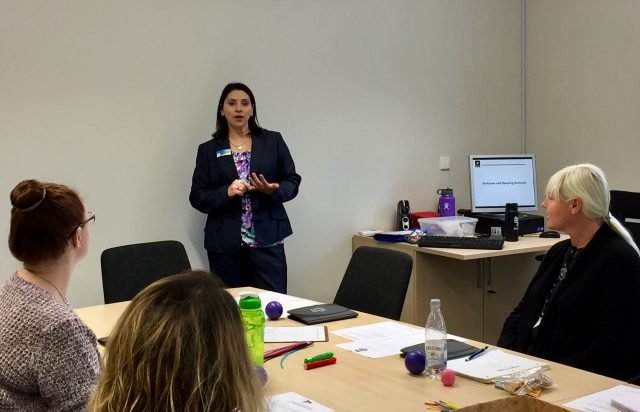
By Holly DeCarlo-White
USAG Stuttgart Public Affairs Office
For more than 30 years, the Army Family Action Plan has been making a positive difference in the quality of life of service members and their families with more than 698 issues presented and thousands of regulatory changes through grass-root garrison forums around the world.
U.S. Army Garrison Stuttgart Army Community Service hosted an AFAP Forum, Nov. 9, to discuss quality of life improvement ideas submitted by fellow community members. The AFAP Forum is open to all branches of service in the Stuttgart military community: service members, Department of Defense civilians, retirees, and their family members.
“We all have a goal and we all have a say in what happens here…everyone had an opportunity to submit issues online or in person,” said Ginalyn Cowles, ACS coordinator and AFAP Forum lead.
AFAP began as the brainchild of a few Army spouses and has since expanded into a successful Army-wide process. The goal of the AFAP is to identify and prioritize quality of life issues by focusing on creative ways to improve services and the satisfaction of members within a military community. While it is an Army program in name, the Army’s status as the Department of Defense executive agent for the Stuttgart installations in Germany means that many of its improvements impact the quality of life for all service members stationed here.
“It’s the voice of the customer and it is our voice in the Army. We have all said, ‘if I was in charge of the Army I would…’ – this is your opportunity,” she added.
There were six issues submitted for review at the 2016 USAG Stuttgart AFAP Forum, which was open to all community members to attend. Discussions included: Family and Morale Welfare and Recreation consolidation communication, fitness centers, on-post sidewalks, the ACS Lending Closet process in regard to baby items, and the availability of community accessible business services across Stuttgart installations.
Though all topics are addressed and responded to, this year, one involving time allotted for personal affairs when stationed overseas, was recommended by a group vote for elevation to the DOD. The issue is scheduled to be presented to the USAG Stuttgart command team in December.
According to Cowles, the AFAP process starts with identifying issues at the garrison level which are then pushed forward and examined among other issues submitted across the European region. They then determine which items to push up to the Department of the Army.
Policy changes that resulted from past AFAP issues include:
- Allowing Soldiers to request tour stabilization if they have a graduating high school senior (Issue 453)
- Authorizing Family Readiness Group newsletters to include unofficial information if it does not exceed 20% of the printed space (Issue 460)
- Tax credit for employers of Reserve Component Soldiers on extended Active Duty (Issue 486)
- Medical care access for non-dependent caregivers at the Military Treatment Facility while they attend to their Soldier (Issue 619)
- Revision of AR 600-8-101 requiring picture of Soldiers annually during the SRP process (Issue 640)
- DA Pam revision with requirement to perform sole duties as the BOSS president for minimum of two years (Issue 636)
- Duration of Transitional Compensation for Abused Dependents to 36 months (Issue 540)
Have ideas on how the DOD can improve the quality of life for service members, DOD civilians, and their families?
All ID cardholders are encouraged to share their improvement ideas and issues, and join the committee being formed at USAG Stuttgart’s ACS, located in Building 2915, 2nd floor on Panzer Kaserne or call DSN: 431-2268/3362 or civ. 07031-15-2268/3362 for more information.
USAG Stuttgart workforce are encouraged to also submit process improvements through the Knowledge Management Working Group via the garrison SharePoint (CAC access only), here.
